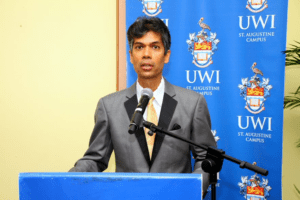‘Many underachievers and school dropouts in poverty-stricken and marginalised neighbourhoods are vulnerable and easily attracted to gangs’

IN 2013, a 16-year-old student was murdered on his first day at school at the Laventille Technology and Continuing Education Centre in T&T.
In subsequent years there were reports of stabbings and fights in schools. These tragedies partly stem from the culture of male underachievement that does not focus on nourishing the mind and talents.
The troubling scenario that exists in our schools is not isolated but linked to the disrespect for life in our communities. Many underachievers and school dropouts in poverty-stricken and marginalised neighbourhoods are vulnerable and easily attracted to gangs.
Indeed, the cycle of poverty is one of the causes of the problem of male underachievement.
It is a vicious cycle and difficult to break.
‘Men and boys are wrongly stereotyped as being unable to cope with academic studies, incapable of being the breadwinner in the family and irresponsible’
The young male sees the gang leaders and criminals in the society as achieving wealth through crime and this appears to be so much faster than hard work and the slow process of education. These young males fail to see education as the key to break this cycle. They want a ‘quick fix’ today in this fast-paced world and will not postpone gratification of any kind.
Underachieving males are like walking ‘time bombs’ and their explosions injure innocent citizens. Undoubtedly, these underachievers suffer from emotional and psychological problems. Men and boys with the underachieving mentality are really victims but would be accused by many in society as creators of social problems and a fractured society.
The characteristics of an underachiever include:
- a brazen, bold and bullying outer character masking an inferiority complex;
- low self-esteem;
- blatant refusal to obey rules and laws; and
- the apparent disregard for help or advice.
The frustration and anguish endured by male underachievers may often lead to mental disorders as depression, nervous breakdowns, suicide attempts or violence in society.
Indeed many of them may be underachievers because they have undiagnosed mental or physical problems.
The underachiever who refuses to improve educationally or even attain high standards in any life situation could react violently to innocent or unsuspecting members of society.
Such boys and men would become bitter and hate or envy others who seem to have wealth and prestige in society or have higher goals and aspirations.

Yes, the underachiever who is alienated and marginalised would not be able to properly develop interpersonal skills and interaction with others.
A major impact of male underachievement on our society is the distorted image of masculinity presented to the public. Yes, many people have easily stereotyped all our boys and men as low performers and underachievers. Thus, the good and progressive men and boys remain invisible.
‘Trinidad and Tobago has ignored and trivialised the problems facing males, and thus reaping the whirlwind’
Men and boys are wrongly stereotyped as being unable to cope with academic studies, incapable of being the breadwinner in the family and irresponsible.
A minority of male underachievers has created a sub-culture that threatens to destroy the progressive movement being undertaken by those persons promoting International Men’s Day. The relatively high levels of unemployment and unemployable young men are partly due to male underachievers who lack ambition, because of the causes mentioned above. Additionally, low productivity in our economy is also linked to underachievers.
Often relationships and marriages are affected by this underachieving culture. Some young, educated and progressive women have delayed marriages or remain single rather than marry a male who is incompatible with their vision.
Sometimes separations and divorces are due to the underachieving male being outclassed and outperformed by his wife or partner. A wise woman would not be attracted to a man whose goals include attending parties, fetes and wearing the latest bling!
There is need for further studies in areas of boy’s underachievement involving the learner and the curriculum, and the teaching-learning process.
Undoubtedly, policymakers, educations and practitioners have to collaborate. The society has paid and is paying a heavy price for breeding male underachievers.
Trinidad and Tobago has ignored and trivialised the problems facing males, and thus reaping the whirlwind.
Parents, teachers, experts need to overcome the complex interplay between boys and factors like socio-economic status, location and types of schooling, parental education, kindergarten experiences, personality and learning styles. We must find solutions to end the causes of this regressive and backward culture of underachievement that has affected the male psyche.
Dr Jerome Teelucksingh is an activist. He initiated the inaugural observances of International Day for the Elimination of Violence Against Men and Boys (January 31) and World Day of the Boy Child (May 16). He has made academic presentations at tertiary institutions including Harvard University and Oxford University.
See other articles by Dr Jerome Teelucksingh on AZP News:
Can we Eradicate Underachievement?
A Quiet Pandemic: Male Underachievement
The Blackest Thing in Slavery wasn’t Slaves
The Importance of Emancipation Day
Tobago’s Working Class in the 1920s, 1930s
Are Humble Caring Fathers Champions?
Influencing West Indian Masculinity
Defining Caribbean Masculinity
Is Monogamy Encouraged in the Caribbean
Naps Girls: From Humble Beginnings to Excellence
US Media Creates Cultural Dependency in the Caribbean
Bloodless Revolution to Save Lives in Developing Countries
The Need for a Social and Moral Revolution
The Law of Supply and Demand in Developing Countries
End the Dependency for Developing Countries
T&T Carnival and the Emperor’s New Clothes
The Influence of Labour on Caribbean Integration
The illusion of political Unity
Presbyterians in Trinidad: Humble Missionaries, Local Workers
Religious Plurality: Curse or Blessing
Caribbean Youth Need Optimism, Patriotism
Rethinking Identities in Caribbean, Latin America
November 19: All Inclusive International Men’s Day
Should International Agencies be Blamed for Unemployment
A Need to Observe Word Unemployment Day
An Ideology for the Trade Union Movement
The Man who Couldn’t be Prime Minister
Social Outburst vs Social Revolution
Challenges of the Men’s Movement
If George Floyd was Denied Parole
The Meaning of Indian Arrival Day in T&T
International Men’s Day – A Way of Life
Wounds that cause school violence
May Day: A Time for Solidarity, Strength
Who Coined the Term ‘Black Power’
The illusion of political Unity
Presbyterians in Trinidad: Humble Missionaries, Local Workers
Religious Plurality: Curse or Blessing
Caribbean Youth Need Optimism, Patriotism
Rethinking Identities in Caribbean, Latin America
November 19: All Inclusive International Men’s Day
Should International Agencies be Blamed for Unemployment
A Need to Observe Word Unemployment Day
An Ideology for the Trade Union Movement
The Man who Couldn’t be Prime Minister
Social Outburst vs Social Revolution
Challenges of the Men’s Movement
If George Floyd was Denied Parole
The Meaning of Indian Arrival Day in T&T
International Men’s Day – A Way of Life
Wounds that cause school violence
May Day: A Time for Solidarity, Strength
Who Coined the Term ‘Black Power’
![]()












